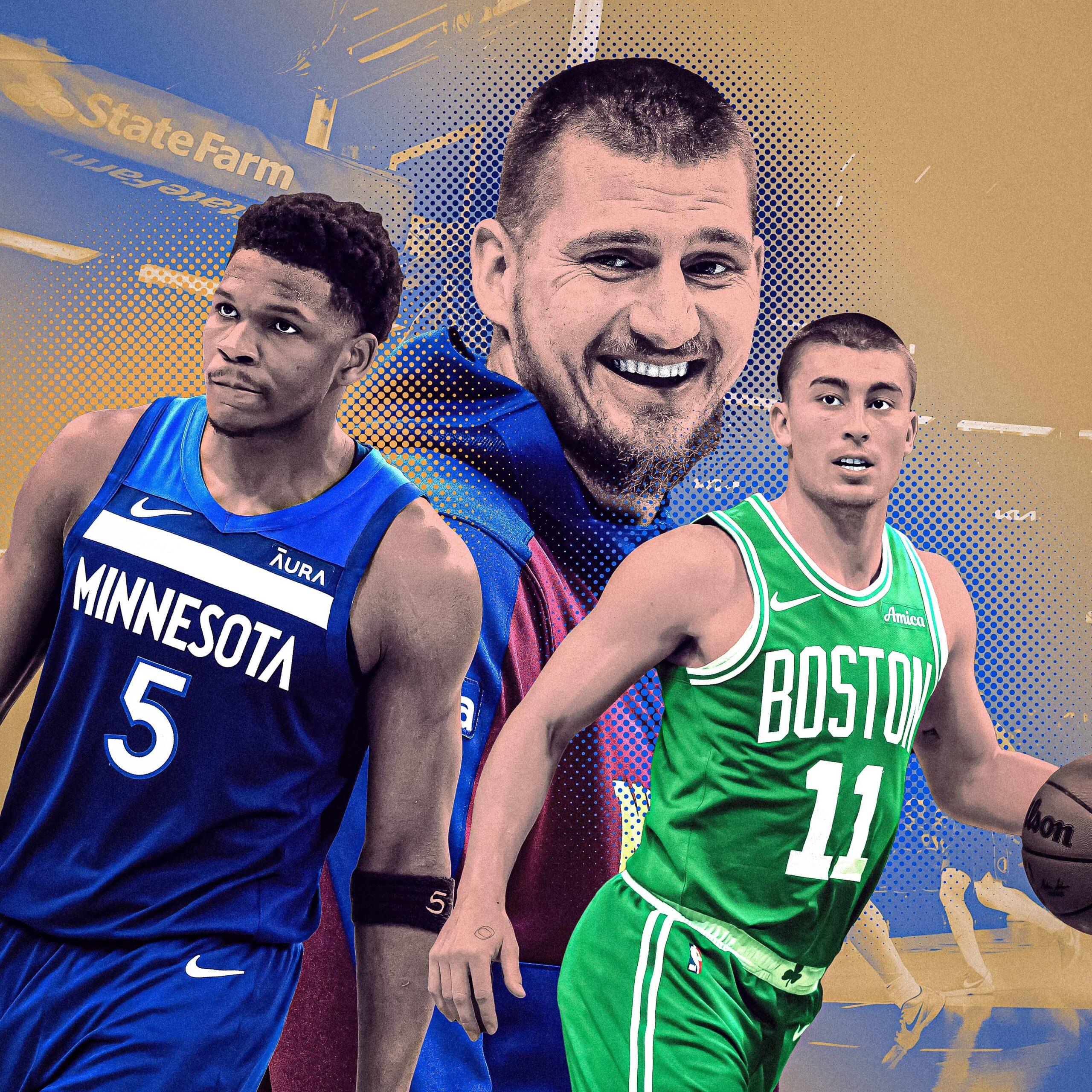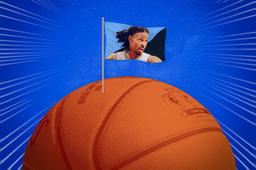
We’re somehow a quarter of the way through the NBA’s 2024-25 regular season. In spite of the court Washington has decided to use during the NBA Cup, it’s been fun! The action has been stellar, the results have been unpredictable, and every night a whole bunch of quality teams work their way toward discovering how good they can actually be. With 20 or so games in the books, we also have enough evidence to honor some deserving award winners, of the traditional and imaginary sort. Without further ado, let’s pop open the hood.
Most Valuable Player: Nikola Jokic
Jokic entered this season regarded by all who know ball as the best player alive. At the same time, his own standard for greatness prematurely cast doubt on his ability to add another MVP trophy to the three he already owns. The award’s voting body (i.e., restless media members) tends to get tired of the same story. Voters want invigorating narratives and are eager to crown fresh blood, be it Shai Gilgeous-Alexander, Jayson Tatum, Anthony Edwards, Luka Doncic, or another, younger, ascending superstar.
But seven weeks into this season, Jokic has somehow managed to be better than ever before, eclipsing everyone else’s candidacy for an honor he, ironically, doesn’t even really care that much about. Icon.
Numbers can’t fully capture just how truly overwhelming Jokic is every time he steps on a court, but they do a pretty good job of summarizing his impact. Here are a few that make it impossible to vote for anyone else:
- He’s averaging 29.6 points (fourth in the league), 13.2 rebounds (first), and 10.7 assists (second) per game. For those keeping score at home: Yes, the man is not only averaging a triple-double but doing so while threatening to lead the league in all three major categories. This is unheard-of.
- He’s made 50.8 percent of his 3s, the second-best mark in the league, on a career-high 4.3 attempts per game.
- He’s second in the NBA in estimated plus-minus, and he leads the NBA in win shares, BPM, VORP, DARKO, LEBRON, and every other catch-all metric I’ve seen.
- His PER is the second-highest ever recorded … to himself!
- He ranks second in true usage percentage, with the highest mark of his career.
- When he’s on the court, Denver’s offensive rating is 128.5 (best among all players who average at least 25 minutes per game). When he’s off the court, Denver’s offensive rating is 97.7. That gap is the widest in the league by a comical margin.
If stats aren’t enough, here’s one of literally hundreds of examples that show how Jokic pretty much does everything to help his team score:
Nobody else manipulates every aspect of the game like he does. Nobody else makes their teammates better. Nobody else is better prepared or more consistent. He’s the sport’s most willing passer and every time he misses a shot it’s a genuine surprise. He can’t be guarded one-on-one in the post. There are no answers. Nothing qualifies as a stopgap solution. And, unlike everyone else who’s reached his level in NBA history, he’s done it all without any All-Star teammates.
Jokic has officially entered the Songs in the Key of Life era of his career: a person comfortably at the top of their profession, somehow delivering a magnum opus with several unimpeachable masterpieces already on their résumé. It’s a sight to behold and a pleasure to witness.
Jokic’s first MVP season felt like an incredible aberration. Giannis Antetokounmpo had won the last two but was unofficially disqualified for a third after failing to win a title. Kawhi Leonard was the game’s best two-way player but didn’t take the regular season seriously enough to be considered. Steph Curry did not make the playoffs. Joel Embiid (the runner-up) appeared in only 51 games.
Jokic’s second MVP was harmless in the sense that he won it despite everyone fully knowing his team could and would not go all the way, a fact that made him an unusual underdog of sorts, appreciated for all he achieved despite not having Jamal Murray or Michael Porter Jr. by his side.
Jokic’s third MVP was a predictable victory lap that landed somewhere between resistant shrug and unavoidable coronation. Years from now, people will look back and tilt their heads when they realize Jokic wasn’t voted MVP (and didn’t make first-team All-NBA, lol) the same year he stomped through the postseason and snatched his first title. No disrespect to Embiid, but Philly’s two-time scoring champ has never been better or more valuable to his team than Jokic has.
The league is overflowing with talent, but there’s only one Nikola Jokic. His value today, with no decline in sight, frankly does not compute.
Honorable mentions: Jayson Tatum, Shai Gilgeous-Alexander, Anthony Davis, Giannis Antetokounmpo
Defensive Player of the Year: Victor Wembanyama
Until voters get sick of giving Defensive Player of the Year to Wembanyama, he is going to win it every season. And he should! This man is a confidence killer. Not only does he lead the NBA in blocks, finishing with at least three in 14 of his 17 games, but when Wembanyama contests a shot at the rim, the opposing field goal percentage is a league-best 20.4 percent lower than what it’s otherwise expected to be. That number reads like science fiction, and doesn’t even account for the shots he stops before they’re even attempted:
Unsurprisingly, according to Sportradar, shooters convert only 45.1 percent of their shots at the rim when Wemby is the closest defender, which is tops out of 95 players who’ve defended at least 50 field goal attempts. It’s spectacular stuff, and he does it all on a defense that rebounds well and hardly ever fouls.
Even when Wemby makes a mistake, his singular length and agility allow him to seemingly stop time, press rewind, then get back in the action to make a play:
When he’s intentionally challenged in the paint, it’s like watching a cocky surfer who thinks they can ride through the tube of a wave that is seconds away from collapsing.
There are other candidates for this award. All are having incredible seasons. None mirror Wemby’s impact, though. He’s a true game-changing presence, in every sense of what that’s supposed to mean.
Honorable mentions: Evan Mobley, Dyson Daniels, Kris Dunn, Jaren Jackson Jr.
Rookie of the Year: Stephon Castle
I wrote this a few weeks ago, but when gauging Castle’s impact, efficiency is less important to me than all the other ways he helps his team win. Yes, Castle owns the eighth-worst true shooting percentage in the entire league. So what! The Spurs have a positive net rating when their first-year guard is on the court without Wembanyama and Chris Paul. Even in just a 177-minute sample size, that’s mesmerizing. When all three share the court, the Spurs’ net rating is +13.4. Incredible. Bottom line: This rookie is all about the team, knows how to win, and has demonstrated myriad rare qualities that prove he’s a keeper.
He already knows how to take advantage of opponents who ignore him on the perimeter, too. In the play below, Castle probably knows he’s going to rifle a pass back to Harrison Barnes in the weakside corner before he even starts his flash cut to the nail:
And over this 30-second stretch at the end of the first half in a win over the Kings, Castle puts his maturity on display, first decelerating at the rim to finish a fastbreak, then shrugging off a switch so he can block De’Aaron Fox’s jumper, which ignites another transition opportunity and swings the entire game’s momentum in San Antonio’s favor:
His defense was at the center of two recent surprising victories against the Golden State Warriors and Oklahoma City Thunder—over half his minutes are spent guarding either the opponent’s first or second option, which leads all rookies. Overall, he leads all rookies in minutes and is third in true usage rate.
Castle isn’t a no-brainer. All the honorable mentions listed below, and a few other rookies, are worthy of consideration, and there’s a decent chance one of them will actually win it. But so far, when contextualized as the rookie who’s done the best job not looking like a rookie in an important role for a competitive team, Castle is the guy.
Honorable mentions: Jared McCain, Dalton Knecht, Jaylen Wells, Zaccharie Risacher
Most Improved Player: Franz Wagner
Orlando’s season could’ve gone in the gutter when Paolo Banchero went down with a serious oblique injury. Instead, Wagner—fresh off signing a semi-controversial maximum extension—has done everything possible to capably substitute what was thought to be irreplaceable production from his All-Star teammate. It’s a stretch that may do wonders for the rest of his career, an opportunity to know what life is like as the no. 1 option on a good team, the pressure it carries and confidence it plants in the body of everyone who can manage, if not flourish.
Wagner is second in estimated wins this season, a reflection of how well he’s handled increased offensive responsibility and the scrutiny that comes with it. Basically all of his per-game averages have never been better, but that’s not what makes him so obvious here. His growth, in the face of what could have been severe hardship, goes deeper. Among all starters, Wagner has made the largest true usage jump in the league without his efficiency taking a meaningful dip.
This was to be expected without Banchero, but Wagner’s ability to keep calm and stay patient in the face of blitzes, double-teams, and aggressive help rotations has helped keep Orlando afloat. He knows how to get off the ball when a second defender comes to harass him, even if it won’t be tallied in the box score, and regularly punishes opponents who think (incorrectly) that squeezing the ball out of his hands is the smart thing to do:
He’s respected enough to warrant extra attention and tall enough to make a play over the top. Franz can skip it to the corner, drop a slick pocket pass, or patiently make the simple read one man away:
The play above shows how broken the Lakers defense is, but also highlights Wagner’s ability to exploit their flaws. This is what All-Stars do, and if we had to pick 24 of them right now he’d clearly be one.
Honorable mentions: RJ Barrett, Jalen Johnson, Norm Powell, Tyler Herro
Sixth Man of the Year: Payton Pritchard
If you caught Boston’s win over the Bulls on Black Friday, you know Pritchard deserves this. The Celtics’ sixth man dramatically extended his scoring lead on every other NBA bench player by dropping 29 points on just 16 shots. There were no turnovers and four offensive rebounds. All addition. Zero subtraction. An absolute fire hose.
In the entire league, Pritchard ranks seventh in 3s per 100 possessions, eighth in 2-point field goal percentage, and 10th in true shooting. Three years ago he requested a trade due to lack of playing time. Two years ago he was in and out of Joe Mazzulla’s rotation. Last season he appeared in all 82 games, hit multiple halfcourt heaves during Boston’s title run, and became a folk hero. But this season, he’s become something else entirely: an invaluable green light who understands and executes his role—run, catch, shoot, splash—and to perfection, always complementing his multiple All-Star teammates and increasing his point total by over six per game (9.6 to 16.0) without stepping on anyone’s toes.
Pritchard has made more 3s this season than Steph Curry, Kyrie Irving, Darius Garland, Trae Young, and Damian Lillard. Many are thanks to his own physicality. Pritchard delivers hard picks that force defenses to switch or fight through, opening up enough time and room for him to slither away and take advantage of the attention his teammates deserve. The Celtics generate 1.17 points per chance when Pritchard sets a ball screen that actually makes contact, per Sportradar. The only guard above him is Dyson Daniels.
It also frees his teammates up to attack mismatches, knowing too much help off Pritchard behind the 3-point line is a sin:
Here’s another example, where Pritchard forces Cam Thomas to switch onto Jayson Tatum, then—as Brooklyn’s defense diverts its attention to the ball—runs down and sets a pindown to help free Sam Hauser for an open 3:
TL;DR: Teams can’t hide their worst defenders on this dude. Remarkably, at 6-foot-1, Pritchard does it all without giving anything up on the other end. Pound-for-pound, his ability to pressure the ball, defend up a position, and evade screens is up there with some of the best undersized guards in the league:
I talked more about Pritchard’s leap right here. And before the season started, I predicted he’d be in this exact conversation. It’s not the revelation some may perceive it to be, but that doesn’t make it any less sublime. (Also: “Pritch better have my money” dodged enough corny raindrops to become the funniest catchphrase uttered by a play-by-play commentator this season.)
Boston was a heavy favorite to repeat as champs before Pritchard’s explosive start. Now, if healthy, it’s even harder to see them losing four times in seven tries. This development was the last thing every other team in the NBA needed to see.
Honorable mentions: Ty Jerome, Amen Thompson, Jake LaRavia, Buddy Hield
Coach of the Year: Ime Udoka
This award is all about expectations—i.e., please raise your hand if 20 games into this season you thought the Rockets would have, arguably, the NBA’s best defense? Or be one game back from first place? Udoka has taken an imperfect roster seemingly littered with holes and turned it into a bear trap. He’s found a way to turn Alperen Sengun—long perceived as a defensive weak link—into a bright spot and galvanize everyone else to embrace the guard-your-yard mandate that’s foundational to their identity and success.
The discipline, prickliness, and physicality on display each and every night embodies and reflects Udoka’s temperament. It’s a culture of accountability, with lofty expectations and the drive to get there. There are so many excellent coaching jobs happening right now. The one in Houston stands above the rest by a hair.
Honorable mentions: Kenny Atkinson, Ty Lue, Jordi Fernández, Taylor Jenkins
Most Unfortunate Offseason Move: Trading Away Karl-Anthony Towns
It’s very early, but several front offices may, at least on a nanosized level, already regret at least one decision they made over the summer. It’s too soon to call anything a disaster, but it’s not too soon to second-guess Minnesota for prematurely breaking up its championship-caliber core.
Trading away Karl-Anthony Towns—a 29-year-old multiple-time All-Star who, for all his warts, spent a majority of his career as the no. 1 reason to feel good about the Timberwolves franchise—for Julius Randle, Donte DiVincenzo, and a protected first-round pick was questionable, at best, in real time. At worst, it will come to be seen as the event that precipitated yet another devastating stretch for an organization that’s all too familiar with catastrophe.
After making the Western Conference finals, the Wolves are just 10-10. Clearly, they miss Towns. They miss his elite outside shooting and the gravity it demands. They miss his sacrifice and professionalism. They miss his willingness to pass out of a double team. They miss his size. They miss all the ways he relieved pressure with or without the ball in his hands.
In recent wins over the Suns and Kings, Phoenix started Jusuf Nurkic and Mason Plumlee (for the first and only time this season) while Sacramento opened up with Domantas Sabonis and Alex Len (for the first and only time this season). These are insulting slaps to the face that would never happen if Towns was still on the team.
Minnesota’s offense is notably less potent, still stuck in the mud, unable to shave appealing lanes of space for Anthony Edwards to blow through despite its rise in 3-point rate. On defense they’ve taken a somewhat foreseeable step backward. The Timberwolves still rank in the top 10 (barely) but are plagued by miscommunication, inconsistent effort, and confusion:
Last season, the Timberwolves’ defensive shell was extended on 24.9 percent of their possessions, per Sportradar. This year, they’re at a league-high 35 percent, which would be perfectly fine if they weren’t allowing 1.5 points per chance at the rim (which ranks 24th) when they do. Towns wouldn’t solve all of these problems by himself, but unlike last year, the team falls apart when Rudy Gobert is off the court.
There’s also the small matter of the Wolves genuinely looking like they do not enjoy playing with each other. You probably already know about the infamous 3-second violation heard around the world near the end of their humiliating loss against the Raptors:
But also just look at Edwards when Rudy switches onto Jayson Tatum here:
Last week’s loss against the Kings will help define the rest of their season; it’s not too soon to fairly view it as a fork-in-the-road kind of night.
Afterwards, Edwards sat at his locker and ripped into the Wolves with a brutally honest diatribe: “We’re soft as hell, internally … we can’t talk to each other. Just a bunch of little kids, just like we playing with a bunch of little kids. The whole team, we just can’t talk to each other,” he said in between several incredulous chuckles.
Edwards accused his teammates of believing they were smarter than their coaches and called them front-runners. “The coach tells us one thing and we go out there and do a whole ’nother thing,” he said. “That’s not our game plan … we’re supposed to be doing a totally different thing.”
More damning sound bites flew. None hinted at a hopeful prognosis:
“I don’t know man, shit’s crazy right now.”
“Everybody’s got a different agenda.”
“We’re just so negative right now.”
Chris Finch had similar thoughts about Minnesota’s fractured condition: “Guys are kind of a little bit in their own world when things aren’t going well for them. And it’s affecting both sides of the ball which, that has to be changed … Our rim protection has been inconsistent, like everything else this season.”
Towns wouldn’t change all of this. But it’s hard to see the Timberwolves being this dysfunctional if they had just bit the financial bullet and didn’t trade a skill set and personality that looks more priceless by the day. To rip that away and then plug in Randle, whose on- and off-court tendencies are selfish more often than not, was always going to be a risk. The good news is it’s not even Christmas. There’s plenty of time for Minnesota to integrate its new pieces and rediscover the good vibes that carried them to the conference finals last season. If not, though, the long-term ripple effects could be truly shattering.
Honorable mentions: The Sixers signing Paul George to what may already be one of the worst contracts in the league; the Pelicans giving up Dyson Daniels and two first-round picks—including the Lakers’ in this year’s draft—for Dejounte Murray (doubling down on Zion Williamson’s ability to stay healthy, which…no); the absurd and detrimental Mikal Bridges trade; And while we’re here, how did the Nuggets re-sign DeAndre Jordan and let Jay Huff go?!
Most Confusing Team: The Sacramento Kings
The Kings are one of two teams that currently have a positive net rating despite being below .500. Nothing and everything about them surprises me. The more I watch, the less I know. Are they unlucky, bad, or indifferently mediocre? Have they finally solved their defensive issues (currently league average overall and first by a mile in at-rim shot frequency)? Is De’Aaron Fox on the cusp of making an All-NBA team and qualifying for a supermax extension, or [whispers] a looming flight risk?
Is DeMar DeRozan an awkward fit or inexorably influential? The Kings are 20th in 3-point rate after ranking third and fifth the past two seasons, respectively. At the same time, they launch more midrange shots than every other team after being allergic to those looks throughout the Mike Brown era. Is Sabonis a (very) dark horse MVP candidate? Why did it take so long for Keon Ellis to start? How is Jae Crowder on the team? Is Keegan Murray broken?
I could go on. But in all that haze are reasons to be bullish, too. The lineup data is reassuring and Malik Monk has been very good since his return from an ankle sprain. (He even started over Ellis on Sunday night, which, on second thought, makes no sense!) Some better health luck, coupled with a return to form from Murray, should make Sacramento a more consistent threat. But up until now, there are so many more questions than answers. They could beat the Rockets and Grizzlies in their next two games and then get blown out by the Jazz later this week, and none of it would make me blink.
Stats current through Sunday’s games.


